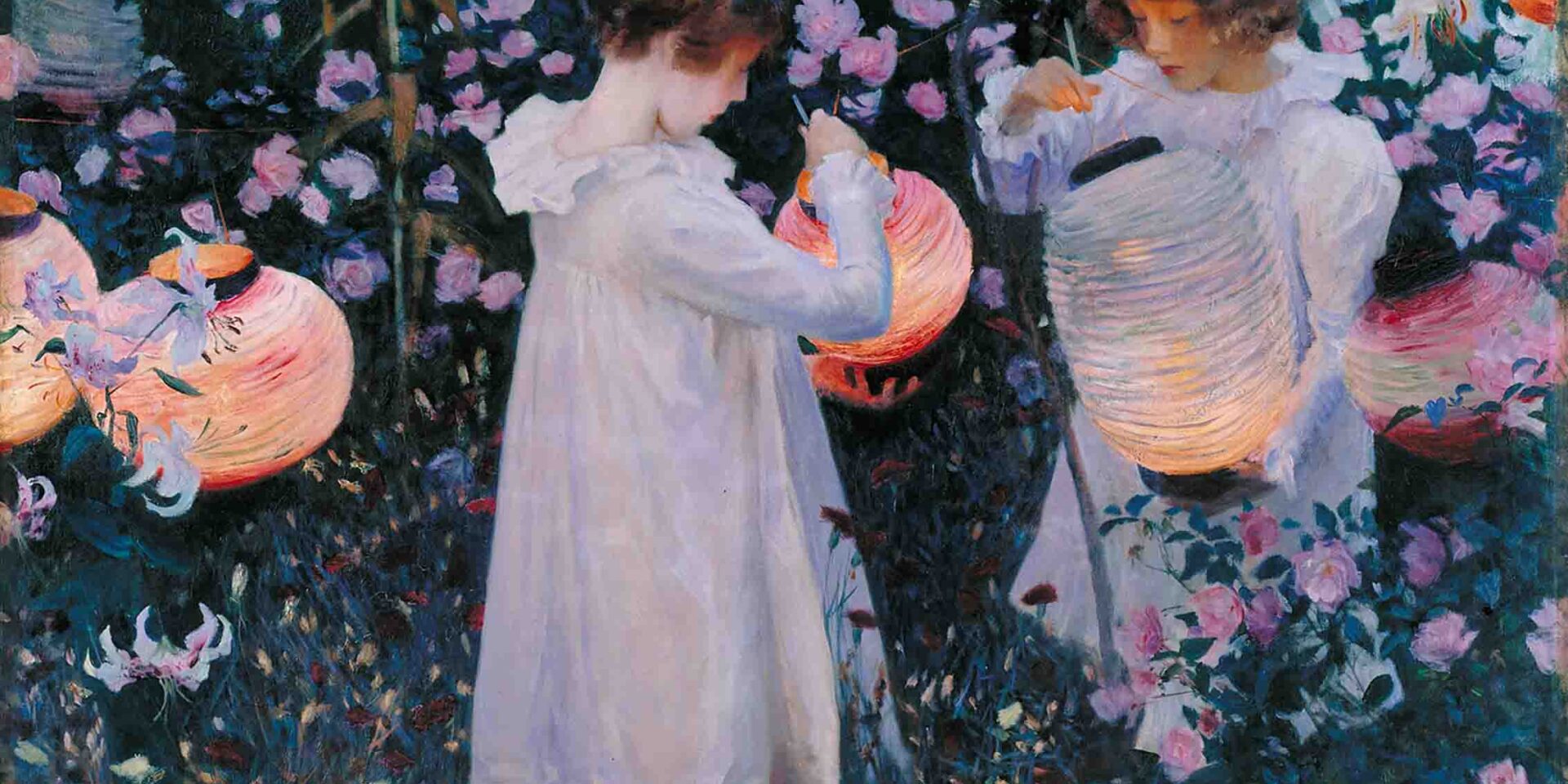Burnt Norton (fragmento)
Traducción del inglés por Daniel Orellano Miranda
Texto original de T.S. Eliot
Edición por Magdalena Holguín
Imagen: «Carnation, Lily, Lily, Rose» de John Singer Sargent
Cuatro Cuartetos — N° 1
I.
El tiempo presente y el tiempo pasado
Estén ambos presentes en el tiempo futuro,
Y el tiempo futuro contenido en el tiempo pasado.
Si todo tiempo es eternamente presente
Todo tiempo es irredimible.
Lo que pudo haber sido es una abstracción
Que sigue siendo posibilidad perpetua
Solo en un mundo de especulación.
Lo que pudo haber sido y lo que ha sido
Tienden a un solo fin, que es siempre presente.
Las pisadas resuenan en la memoria
Van por el pasaje que no tomamos
Hacia la puerta que nunca abrimos
Al jardín de rosas. Mis palabras resuenan
Así, en tu mente.
Pero qué objeto
tiene perturbar el polvo de un cuenco de pétalos de rosa
No lo sé.
Otros ecos
Habitan el jardín. ¿Vamos tras ellos?
De prisa, dijo el pájaro, encuéntrenlos, encuéntrenlos,
Al dar vuelta a la esquina. Tras la primera verja,
En nuestro primer mundo, ¿vamos en pos
Del engaño del tordo? En nuestro primer mundo.
Allí estaban, solemnes, invisibles,
Moviéndose sin presión sobre las hojas muertas,
En el calor de otoño, en el aire vibrante,
Y el pájaro llamó, como respuesta a
La inoída música oculta entre los arbustos.
Y el destello invisible se cruzó, pues las rosas
Tenían el aspecto de flores contempladas.
Allí estaban como nuestros huéspedes aceptados y aceptantes.
Así pues, avanzamos, y ellos, en un patrón formal,
A lo largo del callejón vacío, que cercaban arbustos,
Para mirar dentro del estanque drenado.
Seco el estanque, seco el cemento, pardos los bordes,
Y el estanque estaba lleno de agua de la luz del sol,
Y los lotos se elevaron, en silencio, en silencio,
La superficie brilló desde el corazón de la luz,
Y ellos estaban detrás de nosotros, reflejados en el estanque.
Luego pasó una nube, y el estanque quedó vacío.
Váyanse, dijo el pájaro, porque las hojas estaban llenas de niños,
Ocultos con entusiasmo, conteniendo la risa.
Váyanse, váyanse, váyanse, dijo el pájaro: la humanidad
No puede soportar tanta realidad.
El tiempo pasado y el tiempo futuro
Lo que pudo haber sido y lo que ha sido
Tienden a un solo fin, que es siempre presente.
(No. 1 of ‘Four Quartets’)
I.
Time present and time past
Are both perhaps present in time future,
And time future contained in time past.
If all time is eternally present
All time is unredeemable.
What might have been is an abstraction
Remaining a perpetual possibility
Only in a world of speculation.
What might have been and what has been
Point to one end, which is always present.
Footfalls echo in the memory
Down the passage which we did not take
Towards the door we never opened
Into the rose-garden. My words echo
Thus, in your mind.
But to what purpose
Disturbing the dust on a bowl of rose-leaves
I do not know.
Other echoes
Inhabit the garden. Shall we follow?
Quick, said the bird, find them, find them,
Round the corner. Through the first gate,
Into our first world, shall we follow
The deception of the thrush? Into our first world.
There they were, dignified, invisible,
Moving without pressure, over the dead leaves,
In the autumn heat, through the vibrant air,
And the bird called, in response to
The unheard music hidden in the shrubbery,
And the unseen eyebeam crossed, for the roses
Had the look of flowers that are looked at.
There they were as our guests, accepted and accepting.
So we moved, and they, in a formal pattern,
Along the empty alley, into the box circle,
To look down into the drained pool.
Dry the pool, dry concrete, brown edged,
And the pool was filled with water out of sunlight,
And the lotos rose, quietly, quietly,
The surface glittered out of heart of light,
And they were behind us, reflected in the pool.
Then a cloud passed, and the pool was empty.
Go, said the bird, for the leaves were full of children,
Hidden excitedly, containing laughter.
Go, go, go, said the bird: human kind
Cannot bear very much reality.
Time past and time future
What might have been and what has been
Point to one end, which is always present.
(No. 1 of ‘Four Quartets’)
I.
Time present and time past
Are both perhaps present in time future,
And time future contained in time past.
If all time is eternally present
All time is unredeemable.
What might have been is an abstraction
Remaining a perpetual possibility
Only in a world of speculation.
What might have been and what has been
Point to one end, which is always present.
Footfalls echo in the memory
Down the passage which we did not take
Towards the door we never opened
Into the rose-garden. My words echo
Thus, in your mind.
But to what purpose
Disturbing the dust on a bowl of rose-leaves
I do not know.
Other echoes
Inhabit the garden. Shall we follow?
Quick, said the bird, find them, find them,
Round the corner. Through the first gate,
Into our first world, shall we follow
The deception of the thrush? Into our first world.
There they were, dignified, invisible,
Moving without pressure, over the dead leaves,
In the autumn heat, through the vibrant air,
And the bird called, in response to
The unheard music hidden in the shrubbery,
And the unseen eyebeam crossed, for the roses
Had the look of flowers that are looked at.
There they were as our guests, accepted and accepting.
So we moved, and they, in a formal pattern,
Along the empty alley, into the box circle,
To look down into the drained pool.
Dry the pool, dry concrete, brown edged,
And the pool was filled with water out of sunlight,
And the lotos rose, quietly, quietly,
The surface glittered out of heart of light,
And they were behind us, reflected in the pool.
Then a cloud passed, and the pool was empty.
Go, said the bird, for the leaves were full of children,
Hidden excitedly, containing laughter.
Go, go, go, said the bird: human kind
Cannot bear very much reality.
Time past and time future
What might have been and what has been
Point to one end, which is always present.
(Cuatro Cuartetos — N° 1)
I.
El tiempo presente y el tiempo pasado
Estén ambos presentes en el tiempo futuro,
Y el tiempo futuro contenido en el tiempo pasado.
Si todo tiempo es eternamente presente
Todo tiempo es irredimible.
Lo que pudo haber sido es una abstracción
Que sigue siendo posibilidad perpetua
Solo en un mundo de especulación.
Lo que pudo haber sido y lo que ha sido
Tienden a un solo fin, que es siempre presente.
Las pisadas resuenan en la memoria
Van por el pasaje que no tomamos
Hacia la puerta que nunca abrimos
Al jardín de rosas. Mis palabras resuenan
Así, en tu mente.
Pero qué objeto
tiene perturbar el polvo de un cuenco de pétalos de rosa
No lo sé.
Otros ecos
Habitan el jardín. ¿Vamos tras ellos?
De prisa, dijo el pájaro, encuéntrenlos, encuéntrenlos,
Al dar vuelta a la esquina. Tras la primera verja,
En nuestro primer mundo, ¿vamos en pos
Del engaño del tordo? En nuestro primer mundo.
Allí estaban, solemnes, invisibles,
Moviéndose sin presión sobre las hojas muertas,
En el calor de otoño, en el aire vibrante,
Y el pájaro llamó, como respuesta a
La inoída música oculta entre los arbustos.
Y el destello invisible se cruzó, pues las rosas
Tenían el aspecto de flores contempladas.
Allí estaban como nuestros huéspedes aceptados y aceptantes.
Así pues, avanzamos, y ellos, en un patrón formal,
A lo largo del callejón vacío, que cercaban arbustos,
Para mirar dentro del estanque drenado.
Seco el estanque, seco el cemento, pardos los bordes,
Y el estanque estaba lleno de agua de la luz del sol,
Y los lotos se elevaron, en silencio, en silencio,
La superficie brilló desde el corazón de la luz,
Y ellos estaban detrás de nosotros, reflejados en el estanque.
Luego pasó una nube, y el estanque quedó vacío.
Váyanse, dijo el pájaro, porque las hojas estaban llenas de niños,
Ocultos con entusiasmo, conteniendo la risa.
Váyanse, váyanse, váyanse, dijo el pájaro: la humanidad
No puede soportar tanta realidad.
El tiempo pasado y el tiempo futuro
Lo que pudo haber sido y lo que ha sido
Tienden a un solo fin, que es siempre presente.
Daniel Orellano Miranda nació en Lima, Perú, el 20 de diciembre de 1998. Es bachiller en Literatura por la Universidad Nacional Mayor de San Marcos, Perú. Además, es profesor certificado de Español como Lengua Extranjera por la Escuela de Español Tía Tula, España. Asimismo, hizo una especialización en Traducción Literaria (Inglés) y es maestrando en Estudios de Teatro y Cine Latinoamericano y Argentino, ambos por la Universidad de Buenos Aires, Argentina. Se dedico a enseñar español como lengua extranjera y trabajar en su tesis de especialización en traducción literaria «Una breve aproximación a una historia de la traducción editorial en el Perú contemporáneo. El caso de las colecciones de premios Nobel (2003 y 2017) distribuidas en quioscos de periódico por ‘El Comercio‘».

